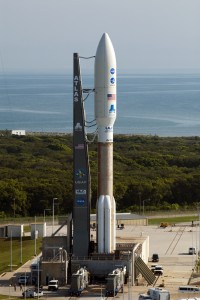 According to a statement from NASA, the space agency signed a joint agreement this week with the National Reconnaissance Office (NRO) and the U.S. Air Force. The agreement establishes a clear set of criteria for certification of commercial providers of launch vehicles used for national security space and civil space missions.
According to a statement from NASA, the space agency signed a joint agreement this week with the National Reconnaissance Office (NRO) and the U.S. Air Force. The agreement establishes a clear set of criteria for certification of commercial providers of launch vehicles used for national security space and civil space missions.
The U.S. government is committed to procuring commercial launch services for its satellite and robotic missions, including Evolved Expendable Launch Vehicle, or EELV, launches. The new entrant launch vehicle certification strategy is the latest step in a cooperative effort by the Air Force, NASA and NRO to take advantage of new launch capability for the three agencies’ missions.
The agencies previously signed a Letter of Intent in October 2010, signaling their collaboration on launch requirements. A memorandum of understanding was signed in March, outlining their plans for future EELV-class launch vehicle acquisition, including the need for a coordinated strategy for certification of new entrant launch systems.
The basis of the new strategy comes from NASA’s existing policy directive for launch vehicle risk mitigation. It also recognizes that mission-unique requirements from each of the three agencies may result in different certification approaches to mitigate launch risk. The document provides a common framework and language among the agencies for communicating expectations to new launch service providers.
The risk-based certification framework allows the agencies to consider both the cost and risk tolerance of the payload and their confidence in the launch vehicle. For payloads with higher risk tolerance, the agencies may consider use of launch vehicles with a higher risk category rating and provide an opportunity for new commercial providers to gain experience launching government payloads.
Within a given risk category rating, if new entrants have launch vehicles with a demonstrated successful flight history, then the government may require less technical evaluation for non-recurring certification of the new launch system. This new strategy further enables competition from emerging, commercially developed launch capabilities for future Air Force, NASA, and NRO missions.
![Herbal Reference Substances are Key to Everyday Products <!-- AddThis Sharing Buttons above -->
<div class="addthis_toolbox addthis_default_style " addthis:url='http://newstaar.com/herbal-reference-substances-are-key-to-everyday-products/3512112/' >
<a class="addthis_button_facebook_like" fb:like:layout="button_count"></a>
<a class="addthis_button_tweet"></a>
<a class="addthis_button_pinterest_pinit"></a>
<a class="addthis_counter addthis_pill_style"></a>
</div>When it comes to quality control testing and the development of new products, Botanical Reference Materials (BRMs), also known as Herbal References are critically important. To help companies ultimately obtain all-important FDA approval, the Food and Drug Administration provides in its guidance a recommendation that […]<!-- AddThis Sharing Buttons below -->
<div class="addthis_toolbox addthis_default_style addthis_32x32_style" addthis:url='http://newstaar.com/herbal-reference-substances-are-key-to-everyday-products/3512112/' >
<a class="addthis_button_preferred_1"></a>
<a class="addthis_button_preferred_2"></a>
<a class="addthis_button_preferred_3"></a>
<a class="addthis_button_preferred_4"></a>
<a class="addthis_button_compact"></a>
<a class="addthis_counter addthis_bubble_style"></a>
</div>](http://newstaar.com/wp-content/uploads/2021/02/Achillea_millefolium_flowers-100x100.jpg)
![Quality Electrochemical Biosensors are Critical for Medical, Food and Chemical Industry <!-- AddThis Sharing Buttons above -->
<div class="addthis_toolbox addthis_default_style " addthis:url='http://newstaar.com/quality-electrochemical-biosensors-are-critical-for-medical-food-and-chemical-industry/3512086/' >
<a class="addthis_button_facebook_like" fb:like:layout="button_count"></a>
<a class="addthis_button_tweet"></a>
<a class="addthis_button_pinterest_pinit"></a>
<a class="addthis_counter addthis_pill_style"></a>
</div>A number of industries have, at their core, a need to frequent or even continuous analysis of biological media. These include the medical and pharmaceutical fields, biotech firms, and food and chemical companies. To maintain quality standards and develop new products, these industries rely heavily […]<!-- AddThis Sharing Buttons below -->
<div class="addthis_toolbox addthis_default_style addthis_32x32_style" addthis:url='http://newstaar.com/quality-electrochemical-biosensors-are-critical-for-medical-food-and-chemical-industry/3512086/' >
<a class="addthis_button_preferred_1"></a>
<a class="addthis_button_preferred_2"></a>
<a class="addthis_button_preferred_3"></a>
<a class="addthis_button_preferred_4"></a>
<a class="addthis_button_compact"></a>
<a class="addthis_counter addthis_bubble_style"></a>
</div>](http://newstaar.com/wp-content/uploads/2020/10/Electrochemical-Biosensor-100x100.jpg)
![Company Develops Industrial Mixers Well-Suited for both Fragile and Explosive Products <!-- AddThis Sharing Buttons above -->
<div class="addthis_toolbox addthis_default_style " addthis:url='http://newstaar.com/company-develops-industrial-mixers-well-suited-for-both-fragile-and-explosive-products/3512071/' >
<a class="addthis_button_facebook_like" fb:like:layout="button_count"></a>
<a class="addthis_button_tweet"></a>
<a class="addthis_button_pinterest_pinit"></a>
<a class="addthis_counter addthis_pill_style"></a>
</div>Industrial drum mixers are normally applied to blend mixes of varying viscosities such as adhesive slurries or cement. Some of these mixers have the capability of blending mixes of very different particle sizes such as fruit and ice cream, and gravel and cement slurry. The […]<!-- AddThis Sharing Buttons below -->
<div class="addthis_toolbox addthis_default_style addthis_32x32_style" addthis:url='http://newstaar.com/company-develops-industrial-mixers-well-suited-for-both-fragile-and-explosive-products/3512071/' >
<a class="addthis_button_preferred_1"></a>
<a class="addthis_button_preferred_2"></a>
<a class="addthis_button_preferred_3"></a>
<a class="addthis_button_preferred_4"></a>
<a class="addthis_button_compact"></a>
<a class="addthis_counter addthis_bubble_style"></a>
</div>](http://newstaar.com/wp-content/uploads/2020/06/bandeau-sofragir2-100x100.jpg)